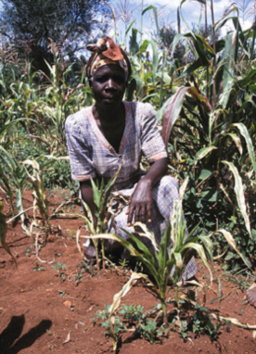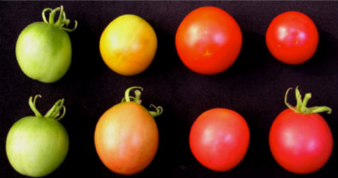
Despite advances in agriculture, the numbers of the world’s hungry are increasing. The World Health Organization has stated that lack of food is the world’s number one health risk. About 170 million children in impoverished countries are underweight because of lack of food. The “green revolution” of the last century, dependent on pesticides and chemical fertilizers, bypassed many of the world’s poorest farmers — the very people that needed it most. In addition, the pressures on land and water resources created by growing populations in some of the planet’s least-developed regions contribute to the crisis.
Driven by an awareness of the world’s need for food, researchers at the Weizmann Institute of Science are unlocking the secrets of plant metabolism, genetics, and development and are concentrating their biochemical, molecular, and genomics-oriented research to eliminate hunger and malnutrition in developing countries, and to improve human health all over the world.
Just a few examples of their extraordinary research are below:

Kenyan farmer in an experimental corn field that uses Weizmann-developed methods.
Fighting a crop-killing parasite. According to the UN, close to 25,000 people die every day of starvation around the world. This devastation is substantially concentrated in Africa. Witchweed (Striga hermonthica), a parasitic weed that drains the nutrition and water from crops, thus killing them before they grow, is widespread across the continent, where an estimated 100 million farmers lose half their crop yield annually to such parasites.
Fortunately, Weizmann scientists have developed a method for preventing witchweed by disrupting its growth before it reaches a damaging size. Thanks to this approach, maize yields have tripled. The new varieties have been released to seed companies, which have commercialized them in western Kenya and Uganda and are continuing to breed resistant varieties that are appropriate for other regions. Read more
Wheat with almost double the yield. Weizmann Institute scientists developed new varieties of wheat that provide a nearly 40 percent higher yield. This achievement allows for production of more wheat grains and more wheat protein per unit of growing area. These improved varieties also produce hardier crops that are better able to resist disease and natural damage, such as insects and drought. Read more
Boosting a plant’s natural defenses. Feeding the world is all the more challenging because a staggering proportion of crop yields worldwide — close to one-third — is regularly lost to pests, disease, and weather. Fortunately, researchers in the Weizmann Institute’s Department of Plant Sciences focus on research that can help increase yields by reducing these losses. Research is particularly aimed at understanding — and ultimately enhancing — the plant’s natural defenses against a variety of ills. Read more

Genetically modified tomatoes produced by the Department of Plant Sciences.
Environmentally friendly pesticide for better crops. An underlying aim of the Weizmann Institute’s plant sciences research is to reduce dependence on artificial fertilizers, pesticides, and herbicides in order to create sustainable agriculture in developing nations. To that end, soil microbiologists at the Institute are harnessing a fungus, Trichoderma, to act as an environmentally friendly pesticide. They have also identified a gene originating in wild tomato plants that provides resistance against wilt disease. The presence of genes that provide plants with disease resistance may greatly decrease the need for spraying crops with pesticides that may cause environmental damage. Read more
